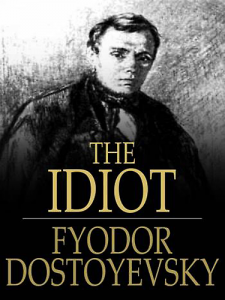 [/caption]
[/caption]DESCRIPTION
Returning to Russia from a sanitarium in Switzerland, the Christ-like epileptic Prince Myshkin finds himself enmeshed in a tangle of love, torn between two women—the notorious kept woman Nastasya and the pure Aglaia—both involved, in turn, with the corrupt, money-hungry Ganya. In the end, Myshkin’s honesty, goodness, and integrity are shown to be unequal to the moral emptiness of those around him. In her revision of the Garnett translation, Anna Brailovsky has corrected inaccuracies wrought by Garnett’s drastic anglicization of the novel, restoring as much as possible the syntactical structure of the original.The Idiot, byFyodor Dostoevsky, is part of the Barnes & Noble Classics series, which offers quality editions at affordable prices to the student and the general reader, including new scholarship, thoughtful design, and pages of carefully crafted extras. Here are some of the remarkable features ofBarnes & Noble Classics: All editions are beautifully designed and are printed to superior specifications; some include illustrations of historical interest.Barnes & Noble Classicspulls together a constellation of influences--biographical, historical, and literary--to enrich each reader's understanding of these enduring works. Just two years after completingCrime and Punishment,which explored the mind of a murderer,Dostoevskyproduced another masterpiece,The Idiot.This time the author portrays a truly beautiful soul--a character he found difficult to bring to life because, as he wrote, "beauty is the ideal, and neither my country, nor civilized Europe, know what that ideal of beauty is." The result was one of Dostoevsky's greatest characters--Prince Myshkin, a saintly, Christ-like, yet deeply human figure. The story begins when Myshkin arrives on Russian soil after a stay in a Swiss sanatorium. Scorned by St. Petersburg society as an idiot for his generosity and innocence, the prince finds himself at the center of a struggle between a rich, kept woman and a beautiful, virtuous girl, who both hope to win his affection. Unfortunately, Myshkin's very goodness seems to bring disaster to everyone he meets. The shocking denouement tragically reveals how, in a world obsessed with money, power, and sexual conquest, a sanatorium is the only place for a saint. Joseph Frankis Professor Emeritus of Comparative Literature at Princeton University and Professor Emeritus of Comparative Literature and Slavic Languages and Literature at Stanford University. He is the author of a five-volume study of Dostoevsky's life and work. The first four volumes received the National Book Critics Circle Award for Biography, two Christian Gauss Awards, two James Russell Lowell Awards of the Modern Language Association, a Los Angeles Times Book Prize, and other honors. Frank is also the author ofThrough the Russian Prism: Essays on Literature and Culture, The Widening Gyre,andThe Idea of Spatial Form.He also wrote the introduction to the Barnes & Noble Classics edition of Dostoevsky'sThe House of the Dead and Poor Folk.
REVIEWS
Fyodor Mikailovich Dostoevsky’s life was a dark and dramatic as the great novels he wrote. He was born in Moscow in 1821, the son of a former army surgeon whose drunken brutality led his own serfs to murder him by pouring vodka down his throat until he strangled. A short first novel, Poor Folk (1846) brought him instant success, but his writing career was cut short by his arrest for alleged subversion against Tsar Nicholas I in 1849. In prison he was given the “silent treatment” for eight months (guards even wore velvet soled boots) before he was led in front a firing squad. Dressed in death shroud, he faced an open grave and awaited execution, when suddenly, an order arrived commuting his sentence. He then spent four years at hard labor in a Siberian prison, where he began to suffer from epilepsy, and he only returned to St. Petersburg a full ten years after he had left in chains.His prison experiences coupled with his conversion to a conservative and profoundly religious philosophy formed the basis for his great novels. But it was his fortuitous marriage to Anna Snitkina, following a period of utter destitution brought about by his compulsive gambling, that gave Dostoevsky the emotional stability to complete Crime and Punishment (1866), The Idiot (1868-69), The Possessed (1871-72), and The Brothers Karamazov (1879-80). When Dostoevsky died in 1881, he left a legacy of masterworks that influenced the great thinkers and writers of the Western world and immortalized him as a giant among writers of world literature.
DETAILS
TITLE: The Idiot (translated by Constance Garnett) (read by Michael Sheen)
Author: Fyodor Dostoyevsky, Constance Garnett
Language: English
Format: mp3 (unabridged, chapterized, and tagged)
SKU: 1idiotdostoevsky3
SHARE LINKS
Mirrors Part IMediafire Part II (recommended)
MIRRORS Part III
Mediafire Part IV (recommended)
Rapidshare Part I
Rapidshare Part II
Rapidshare Part III
Rapidshare Part IV
Megaupload Part I
Megaupload Part II
Megaupload Part III
Megaupload Part IV
No comments:
Post a Comment